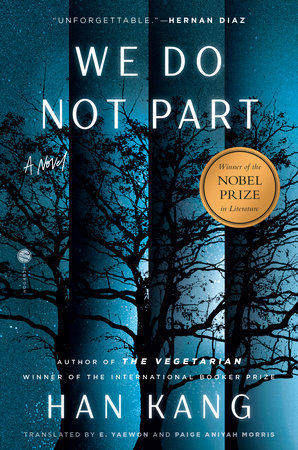By Han Kang
ISBN: 9780593595459
This much-lauded work of fiction leaves readers either deeply appreciative and thinking of it often or extremely confused and disoriented. ‘We Do Not Part’ is not an easy read and in hindsight, some knowledge of the underlying historical events and time to mentally process it, if you end up finishing it, is needed to truly see its worth.
Synopsis
“Han Kang’s most revelatory book since The Vegetarian, We Do Not Part tells the story of a friendship between two women while powerfully reckoning with a hidden chapter in Korean history.
One winter morning, Kyungha receives an urgent message from her friend Inseon to visit her at a hospital in Seoul. Inseon has injured herself in an accident, and she begs Kyungha to return to Jeju Island, where she lives, to save her beloved pet—a white bird called Ama. A snowstorm hits the island when Kyungha arrives. She must reach Inseon’s house at all costs, but the icy wind and squalls slow her down as night begins to fall. She wonders if she will arrive in time to save the animal—or even survive the terrible cold that envelops her with every step. Lost in a world of snow, she doesn’t yet suspect the vertiginous plunge into the darkness that awaits her at her friend’s house.
One winter morning, Kyungha receives an urgent message from her friend Inseon to visit her at a hospital in Seoul. Inseon has injured herself in an accident, and she begs Kyungha to return to Jeju Island, where she lives, to save her beloved pet—a white bird called Ama. A snowstorm hits the island when Kyungha arrives. She must reach Inseon’s house at all costs, but the icy wind and squalls slow her down as night begins to fall. She wonders if she will arrive in time to save the animal—or even survive the terrible cold that envelops her with every step. Lost in a world of snow, she doesn’t yet suspect the vertiginous plunge into the darkness that awaits her at her friend’s house.
What’s to like
Historical fiction is a great way to learn about the history of far-off lands that you would typically not come across. This book is about the violence and generational trauma from the massacre of civilians between 1947 – 1954, suspected of being communist sympathizers on the island of Jeju in present-day South Korea. Like me, if you did not know about the events of this period, then this book serves as a good reason to learn more.
Reading this book, I knew there was a lot I could not understand about it. Han Kang does not write for the novice reader. There are layers upon layers in this book that are not always easy to identify or understand. However, while repetitive, her description of the scenery and the setting with the snow and forlorn isolation accompanying it was eerie and fantastic.
There is a raw honesty that comes off from the narrative. The arc of Kyungha and Inseon’s friendship is beautifully written about. Similarly, Inseon’s relationship with her mother is portrayed such that there are beautiful and uncomfortable parts equal, which is true of any relationship that is not always simple and rosy.
What’s not to like
For someone reading a book by Han Kang for the first time, there is too much to swallow, which I felt as well. The narrative, with its flashbacks, historical narrations, dreams, and a good dose of magical realism, is a heavy load to lift. Without knowledge of the historical events, it was even harder to make sense of the story. At times, the narrative seemed inaccessible, like there was more information that was not being shared. I wish more were shared about Kyungha’s life and her family, who have abandoned her.
In a way, it is hard to know how to feel about the story itself, separated from the historical events. The ending seems abrupt, which is, of course, intentional. As a reader, I wanted to understand the ending. What was Inseon planning on doing about her discoveries of family history?
The fact that this was a short read, under 200 pages, gave me the push to not abandon it.
Overall, I am glad that I read it, and even if I did not understand all the literary aspects of it or the story at times, the overarching goal of bringing attention to forgotten atrocities is a valuable takeaway on its own. Having said that, this book is dark and heavy and definitely not an easy read.
Note:
Book Review Rating: 4/5
Content Warnings: War, torture, violence and death. Age advisory: 18+


